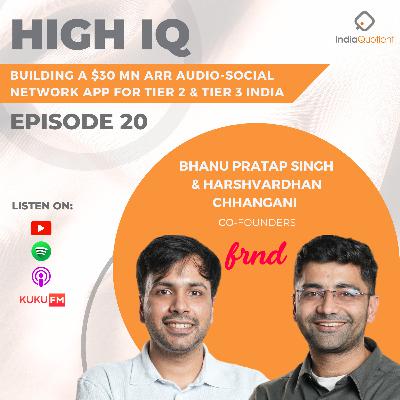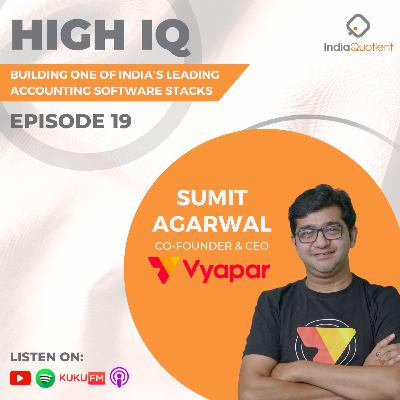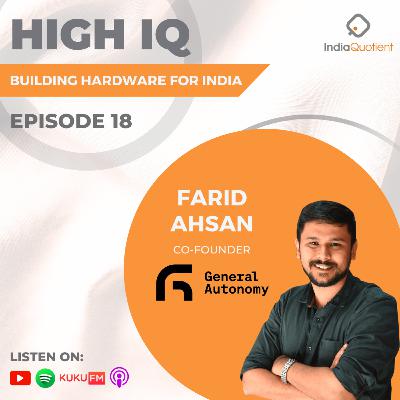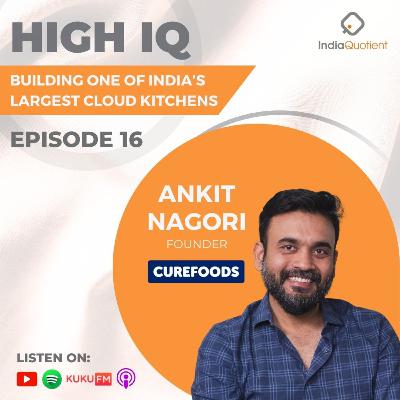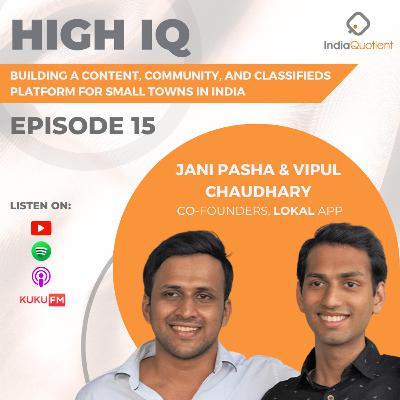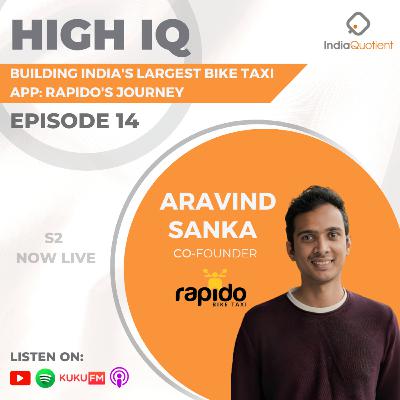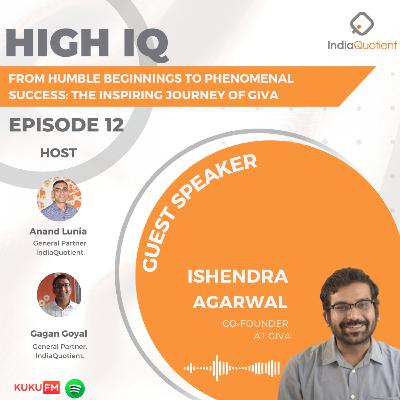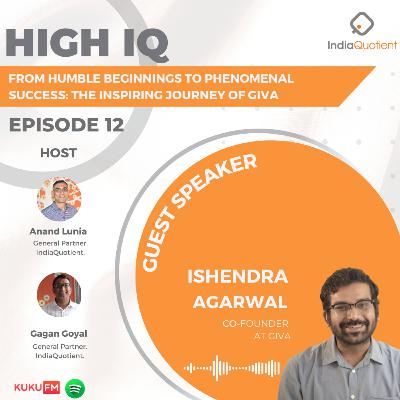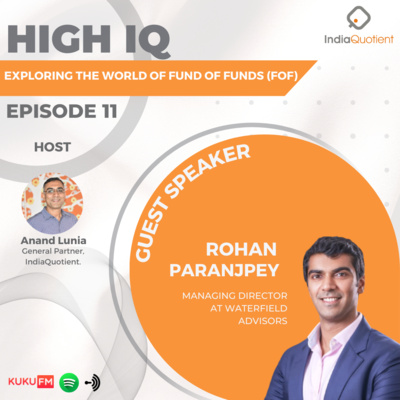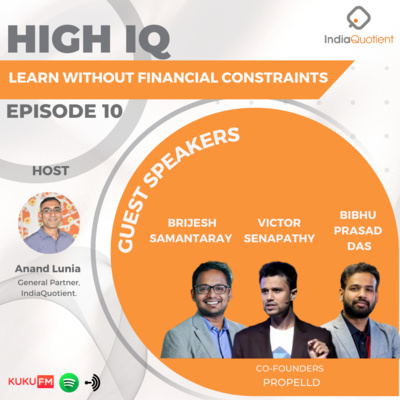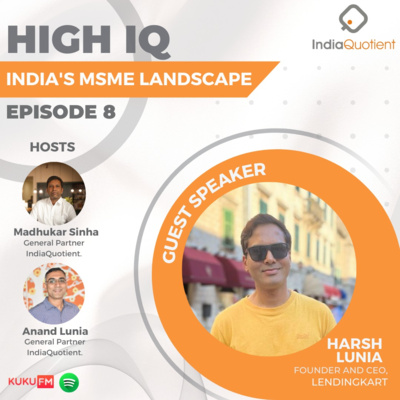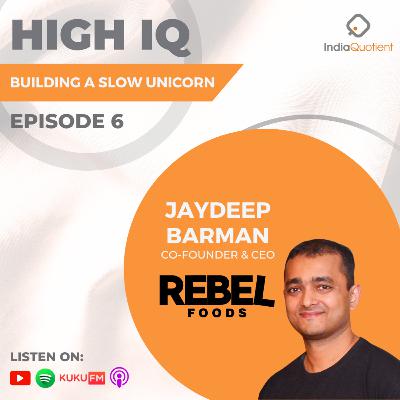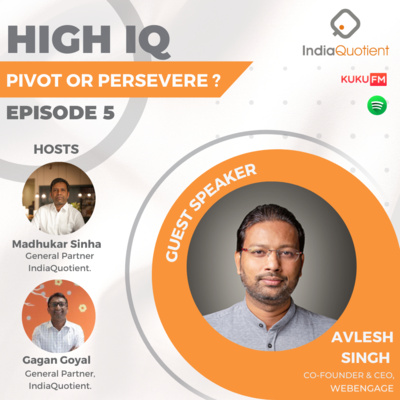Discover High IQ: What Is Your IndiaQuotient?
High IQ: What Is Your IndiaQuotient?

High IQ: What Is Your IndiaQuotient?
Author: IndiaQuotient
Subscribed: 1Played: 0Subscribe
Share
© IndiaQuotient
Description
Ramblings with the IQ team about the India opportunity. While most cynics always look backward while evaluating India, and while most investors get it wrong stretching India to western income levels, we try to look at it from the lens of an entrepreneur who is 'Creating' the market.'
28 Episodes
Reverse
Founded by ex-venture capitalists in 2013, Tracxn has become the go-to private market intelligence platform for VC, PE, and M&A teams across the globe.100 Cr in revenue, tracking data on 4 lakh startups, presence in 50 countries, & serving 70+ Fortune 500 companies.What does it take to build a platform of this scale, from India, and take it public?Neha Singh and Abhishek Goyal, founders of Tracxn, sit down with Anand Lunia, Partner at IndiaQuotient, to share their whole journey to date.Chapters: (00:00) Episode preview (1:21) Meet the Founders: Neha & Abhishek before Tracxn(4:47) The dilemma: Great idea, but who’s going to build it?(5:27) How did the founders meet? (7:00) First version of Tracxn, coded by Neha while still at Sequoia(8:26) Why Tracxn? Why not solve something more mainstream?(10:14) What Tracxn actually does and how big it is today(11:58) Harder to sell in India or the US?(13:31) Where Tracxn gets its data from(14:46) Post-IPO: Revenue, profitability, and what’s next(16:26) Handling data comes with liability—and how they deal with it(17:45) Service element—how Tracxn’s sales process works(19:00) Profitability: Was it always the plan?(21:17) Tracxn’s management is homegrown(22:18) Profit vs. Growth: Investor mindset and the IPO Decision(25:41) Going public doesn’t mean no experiments—thoughts on public markets(27:07) How much funding they raised—and from whom(27:33) IPO: How the board responded to the listing decision(28:44) Tracxn’s IPO timeline(29:38) Should ₹100–200 Cr startups go public? Their view (35:40) Should founders angel invest? (38:05) Why good angels are more than just capital (39:19) Beyond Tracxn: Public life, events, and parenting(41:51) Biggest aha moments (outside the IPO)(44:18) Meeting Mr. Tata (46:05) Founders take on AI (50:00) Advice for founders: What to watch out for(52:30) Founders need to invest in themselves — here’s what worked for them(55:51) Books, podcasts, travel: what’s in their toolkit? (59:54) Managing work-life balance — and task management(1:04:02) Rapid Fire(1:04:09) Who is most likely to miss a morning meeting?(1:04:43) Who is more of a workaholic? (1:04:58) Who takes longer to switch off from work mode? (1:05:21) Who is more likely to bring up Tracxn during vacation?(1:05:59) Koramangala traffic or board meetings?(1:06:10) What’s the most overused word you come across in startup pitches?(1:06:29) Who googles the other person more?(1:06:32) Data room or date nights?
This episode is a masterclass in building for the Bharat consumer. We sat down with Jani Pasha and Vipul Chaudhary, co-founders of Lokal, a content, classifieds, and digital services business for Tier 2 & 3 India doing:₹100Cr+ ARR,growing 20% month on month, andmanaging 30 apps with a tech team of ~25 people. From starting as a hyperlocal content app to adding classifieds and now digital services (i.e., online legal & medical advice, emotional wellness, and astrology), Lokal is playing a key role in defining how India outside the metros accesses the internet.If you're building for the next 500 million Indians coming online from Tier 2 & 3 towns, this one's a must-listen.Tune in and let us know what you think!Chapters: 00:00 – Coming Up: Why Lokal Is Winning in Tier 2 & 3 India1:31 – Intro2:36– The vision that shaped Lokal — and who it’s really for4:06 – How digital services became the next step for a 6-year-old company6:48 – The real problem: solving accessibility in small towns7:07 – Why classifieds couldn’t scale on their own8:18 – Lokal cracked what others couldn’t: here’s how9:47– The Lokal model: simple, online, pay-per-minute11:14 – Business Model: Is Lokal the Zomato or Uber of digital services?12:44 – Why digital services work better when layered on classifieds13:54 – User behavior from classifieds: what they’re learning from usage 16:19 – Why they’re building multiple apps (not one big super app) 17:31 – The content app: Lokal’s branding tool 20:47 – Matrimony in Tier 2+: one category, endless nuance 21:21 – Tier 2+ users do pay — if you get it right 23:25 – Why pay-per-minute pricing actually works here25:04– What Lokal’s conversion rates and user spend tell us 26:31 – Power users in small towns 28:43 – Lokal’s take: why “super app” thinking doesn’t fit Bharat 31:17 – Supply is the real challenge — here’s how Lokal is fixing it 33:59 – What Lokal service providers actually earn 34:34 – How Lokal fixes the “no response” problem 35:50 – User behavior in Tier 2/3 is different38:27 – Privacy challenges in matrimony 39:38 – Matrimony success stories from Lokal40:16 – Privacy across other verticals: legal, real estate & more 41:13 – Lokal’s take on AI: what’s coming next 42:54 – Inside Lokal: team structure and how they work 50:19 – Scaling services: building around proven playbooks52:39 – Rapid fire53:03 – What’s one quirky, fun tradition the two of you have as founders? 53:44 – What’s one truth very few people agree with you on?54:12– Do you have 90-hour work weeks at Lokal? 55:40 – What’s the proudest moment at Lokal? 56:51 – What’s one thing you’ll never put in a pitch deck? 57:10 – What’s one app you just can't live without? 57:28 – What’s the most bizarre thing you’ve done for your startup? 58:12 – What’s the most memorable failure you’ve experienced? 58:52 – If you could go back to Lokal’s early days, what would you tell your past selves? 59:45 – Breaking news or breaking for lunch? 1:00:07 – Bangalore weekends or outside Bangalore?1:00:43– Cricket match or the DOU? 1:01:09 – What’s the last number you see before sleeping?1:01:41 – Late-night debugging or late-night biryani runs? 1:02:18 – Closing
Farmers ordering seeds & fertilizers online? Paying via UPI? Skipping the local shop & buying directly from an app? Booking virtual farm consultations to improve their yield?
That’s exactly what’s happening at BharatAgri, a farming advisory & direct-to-farmers e-commerce platform for crop inputs.
In our latest #HighIQ podcast episode, we sit down with Siddharth Dialani (Co-founder, BharatAgri) & Madhukar Sinha (IndiaQuotient), hosted by Anand Lunia (IndiaQuotient), to break down:
- What is the state of agriculture in India today?—Farming in India needs a lot of fixing, but can we one day realize its true potential & become a global food supplier? What would that take?
- The myth that farmers won’t pay for digital services & order online—they do, as long as there’s value.
- How BharatAgri built an e-commerce platform for farmers from scratch—2 Mn MAUs, 15k+ SKUs, delivering to 20k+ pin codes across India.
- Why farmers are more like urban consumers than we think—the way they buy is changing fast.
- What investors get wrong about India's agri space—funding loans vs. building real solutions.
- Can Amazon just enter and take over?—Why trust & advisory-driven purchases matter.
This episode is a must for anyone building in agriculture in India!
Tune in now and let us know what you think!
Most people in Tier 2 & 3 India have yet to have a meaningful & respectful conversation with the opposite gender because of the stigma surrounding such interactions. Dating isn’t a problem to be solved for them yet, & traditional interaction & social network apps, often visual & Western first, fail to cater to the needs of this audience. So, how do you solve for 'people discovery' in small towns in India? That’s where Frnd comes in—an audio-social network app that creates safe virtual spaces for genuine interactions in conservative settings.
In this episode, Bhanu Pratap Singh Tanwar & Harshvardhan Chhangani (co-founders of Frnd) share their 5-year-long journey of building a social network product for Tier 2 & 3 audiences & scaling it to $30 Mn ARR.
Tune in to hear them discuss:
- Why dating isn’t a mass market problem to be solved in India right now.
- What are the nuances of building for the next billion users?
- How do you build a strong product team that iterates quickly & truly understands user needs?
- What opportunities are yet to be tapped in India's social space? & much more...
Topics covered in the episode:
0:00 - 1:50 - Episode preview
1:51 - 3:57 - What is Frnd?
3:58 - 7:15 - What’s the impact it’s creating?
7:16 - 8:57 - End-user & product relatability
8:58 - 9:55 - What's a Pre-dating ecosystem?
9:56 - 12:40 - Why should a platform like Frnd exist?
12:41 - 14:16 - The challenge around growing loneliness
14:17 - 15:37 - Inspirations from Yahoo Chatrooms & Orkut
15:38 - 18:53 - Why audio first?
18:54 - 19:27 - Is Frnd a marketplace or matchmaking place?
19:28 - 21:02 - Various kinds of user interactions on Frnd
21:03 - 22:28 - What is the aim of the Frnd app?
22:29 - 23:45 - Pseudo-anonymous environment
23:46 - 23:59 - How much revenue does Frnd make?
24:00 - 26:07 - What was the focus of Frnd when it started?
26:08 - 28:00 - First-mover experience for Frnd
28:01 - 30:10 - What’s the user feedback experience?
30:11 - 32:43 - Motivations in the early years of Frnd
32:44 - 39:45 - What are the growth plans for Frnd?
39:46 - 43:20 - 30 Under 30 team
43:21 - 45:01 - Is a team of 30 people better than that of 200?
45:02 - 48:23 - Future product pipelines
Rapid Fire Round
48:35 - 48:54 - What’s your favourite dating app?
48:55 - 48:55 - If your start-up had a mascot, what would it be?
48:56 - 49:18 - What’s the weirdest thing you have done in the name of market research?
49:19 - 49:24 - If your to-do list was a movie, which would it be?
49:25 - 49:29 - If someone said Frnd is a sleazy app, what would be your reaction?
49:30 - 49:30 - What is more terrifying - bug in your code or typo in your investor email?
49:36 - 49:45 - What’s the most bizarre place you have ever taken a business call?
49:46 - 49:56 - What’s your favourite productivity hack at work and in personal life?
49:57 - 50:56 - Any US or Indian company that you really admire?
50:48 - 51:30 - Which is your most favourite Bangalore thing to do?
Founders, your ultimate masterclass on how to build and sell to SMEs is here!
Join us as Sumit Agarwal shares some invaluable insights on how to crack making software for Indian SMEs, drawing from his own experience of building Vyapar—an accounting software stack used by 1 Cr.+ SMEs in India.
Topics covered in this episode:
(0:00) - Episode preview
(1:48) - Who is Sumit Agarwal? How was Vyapar born?
(4:37) - How big is Vyapar?
(5:10) - Who’s purchasing Vyapar’s software?
(5:47) - How has India’s software space evolved?
(9:41) - Is Vyapar’s buyer profile the same as it was 10 years ago?
(10:57) - How did Vyapar tackle Tally’s network effect?
(13:19) - How did Sumit Agarwal get the insight that helped him differentiate Vyapar from Tally?
(16:20) - How did Vyapar approach selling to small businesses in India? What’s Vyapar’s current business model, and how did it evolve over the years?
(20:04) - How much are small businesses in India willing to pay for Vyapar’s software?
(21:24) - What metrics does Vyapar track to analyze whether the software is doing well?
(25:12) - What features are SMBs using the most on Vyapar?
(25:30) - Which company does Vyapar look up to?
(26:20) - What should someone who's building software for India keep in mind?
(27:17) - Why did performance marketing stop working for Vyapar after some initial success? Is it possible for people to scale their businesses online? When should founders start their offline sales journeys?
(30:28) - What has Sumit’s fundraising experience been like? What advice would Sumit give to founders building with family members or if they are building for a tough market?
(32:39) - What else can be built for the SMB market?
Rapid Fire Round
(35:11) - Would Sumit have picked accounting as an alternative career?
(35:32) - What is the first thing that Sumit does when he goes to the office?
(36:10) - Anand Lunia shares a fun anecdote about Jaydeep Barman (co-founder & CEO of Rebel Foods).
(36:33) - What’s the weirdest or most interesting feature request Sumit has received?
(37:01) - What has been Sumit’s proudest moment at Vyapar?
(37:40) - What has been the most challenging moment for Sumit in his journey?
(38:28) - Which Indian founder does Sumit look up to?
(39:10) - Are IITians overrated, or are they worth it?
(40:08) - If Sumit had to create software under Vyapar in a new category, what would it be?
(40:49) - What does Sumit think about monetising by lending?
(41:43) - What is Sumit’s long-term plan for Vyapar?
(42:14) - What role would Sumit never delegate to others?
What is it like to build hardware for India? How can one iterate quickly in hardware? Why aren’t hardware startups mainstream in India? How can VCs support this space?
All this and more in our latest High IQ podcast ep. with Farid Ahsan, co-founder of General Autonomy, a hardware robotics company for automation and increased productivity, and ShareChat, one of India's leading social media platforms.
Tune in now.
In this episode of High IQ podcast, Tanuj Shori, CEO and co-founder of Square Yards - India's largest integrated platform for real estate and mortgages, talks about India's massive Prop Tech opportunity, why you should work with friends and family despite popular opinion, why he is building Square Yards under the radar, and much more! Tune in now.
Join us as we sit down with Ankit Nagori, founder of Curefoods - the company behind some of India’s beloved food brands like EatFit, CakeZone, Sharief Bhai, Nomad Pizza, etc., and take a deep dive into all things cloud kitchens!
Learn about the unit economics of a good cloud kitchen, how to identify if a food brand has achieved product market fit, the power of multi-brand thinking, the scope of cloud kitchens in Tier 2 and Tier 3 cities in India, upcoming trends in India’s food tech market, and much more!
Ankit’s learnings from building Curefoods are a goldmine for food entrepreneurs. Tune in now.
What can failure teach you?
At one of the lowest points in their lives, Jani Pasha and Vipul Chaudhary, co-founders of Lokal, learned a valuable lesson. When you build a product in isolation without talking to users, it will lead to a product that no one will use. Keeping this in mind, the founders went back to the drawing board, conducted countless user studies, identified a need, and validated it - and that’s how Lokal came about. Today, the app is the go-to hub for updates, content, and classifieds for millions of people in 225 districts in India.
Dive into Jani Pasha and Vipul Chaudhary’s journey of building Lokal.
Here’s what you can expect 👇
- Lessons from starting up, failing, & then starting up again
- How intensive user research can be game-changing for building and growing your company
- Behind the scenes of running a content, community, and classifieds platform for small towns in India
- Metrics that Lokal focuses on
- Insights into building a team that understands and creates products for the users!
In this episode, Aravind Sanka unravels Rapido’s journey from its early days, when it was difficult to explain the concept of bike taxis to VCs, to being present in 85+ cities, creating earning opportunities for millions of people, and moving 1 Mn+ customers daily. Gain insights into the business of ride-hailing: Is there scope for economies of scale? Is there a network effect? What’s the profile of drivers? How will EVs impact bike taxis?
Aravind Sanka and Anand Lunia also discuss India’s gig economy, what can be built for blue-collar workers, technological changes fueling ride-hailing services' growth in India, and much more.
Entrepreneurial success is often attributed to a combination of vision, expertise, and grit. For Sudarshan Ravi Jha, co-founder of LetsTransport, it is also about immersing oneself deep in the market.
Tune into High IQ Podcast Ep. 13, where Sudarshan shares his journey of building one of India's fastest-growing logistics companies. He shares the challenges he faced along the way, from navigating the complexities of logistics and supply chain management to raising funding from investors.
He also talks about his motivation for creating LetsTransport and his unwavering commitment to solving inefficiencies in the logistics sector in India. Find out how he and his team achieved remarkable success.
02:00 - Offline expansion and shift from online to omnichannel
05:06 - Battling tumult with changes in business
08:23 - Experiments adapted while offline expansion and general approach
14:45 - Problems faced outside of revenue and metrics used for tracking products and services
17:17 - Benchmarking performance against companies such as Zara and Tanishq
20:00 - Style of building the early team and co-team members
00:50 - Picking brand as a category and the initial idea behind Giva
06:28 - Unique decisions taken during the pivotal journey
12:08- Evolution of the brand and building Giva
17:50 - Framework for CAC
20:52 - Celebrity campaigns and factors affecting performance marketing
00:17 - Rohan’s journey from a VC to a FoF manager
04:30 - Role of an FoF and what is the value it adds—on access, ticket size, governance, and expertise
09:05 - Explaining the layers of fees and their benefits
17:50 - Evaluating the performance of FoFs in the VC space
21:14 - Ideal VC pick and making of a VC portfolio
26:24 - Contribution of FoF to the governance of the fund
Brijesh Samantara, Victor Senapathy, and Bibhu Prasad Das, co-founders at Propelld, believe that there’s no one proven formula to define success.
In this episode, the three co-founders share their “aha” moments in their business journey, starting with the seeds sown during the initial stages of Propelld and transforming the face of financing the education ecosystem.
The podcast delves deep into the importance of making the right choices as an entrepreneur, persevering through challenges, and how valuations have now become validation. Find out how the trio began their quest, from finding a suitable business model to creating a brand that generates hundreds of crores of rupees in revenue.
Sugar Cosmetics' COO and co-founder, Kaushik Mukherjee, explains how betting big on a larger market is better, as in such a market, a mediocre entrepreneur can beat with half the hustle.
Take a deep dive into this episode, where Kaushik talks about the seeds of his entrepreneurship journey being laid down at his IIM interview and the 2 years of MBA to jostling across multiple ideas and fighting for a seed fund. He explains how an entrepreneur should choose what to build and never back down. Find out how the duo faced the highs and lows, seeking fundamental answers from what business to do to finally creating a brand that crossed multiple 100 crores in revenue.
Who would you bet on—conventional, established financial enterprises or new-age data-driven fintech companies?
Lendingkart's CEO and co-founder, Harsh Lunia, is banking on transformation and customisation in the financial sector in India. Tune into this episode where Harsh talks about the MSME landscape in India, changes in consumer behaviour in the financial service sector, his journey as a founder, and advice to aspiring entrepreneurs.
Sumit Agarwal, founder of Vyapar, gets candid and shares his unconventional founder and startup journey with Madhukar and Gagan Goyal from IndiaQuotient. Vyapar is a business accounting software, built in India for small businesses in India.
Sumit Agarwal talks about how one interaction birthed Vyapar, misconceptions of the SMB market in India, the importance of failure in life, how he built Vyapar, the challenges faced, and advises aspiring entrepreneurs.
In this episode, Jaydeep Burman breaks down the journey that made Rebel Foods an adjective synonymous with any successful online restaurant brand across the globe. It transgresses through key ingredients, including people, which were key in creating Rebel, a massive and resilient franchise.
In episode 5 of High IQ podcast, Avlesh Singh talks about his journey of pivoting Webengage from an in-the-moment conversion tool to a full-stack customer engagement solution. He discusses what prompted him to pivot Webengage, the challenges faced in the process, the insights found, and what motivated him to fight the long battle.




